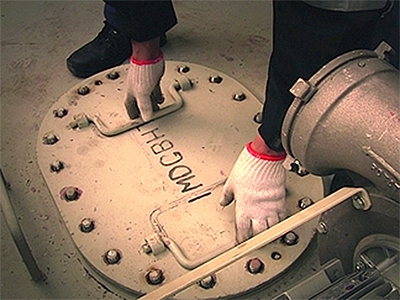Calling for a new drive to end seafarer fatalities in enclosed spaces
Nautilus International is calling for the UK to lead a new and concerted drive to end the appalling litany‘ of seafarer fatalities in enclosed spaces.
The Union has written to shipping minister John Hayes following the latest incident, in which two seafarers died in a cargo hold of the Isle of Man-flagged Carisbrooke Shipping general cargo vessel Sally Ann C last month.
Investigations into the incident – which took place off the coast of west Africa – are underway, but it is known that the chief officer and chief engineer died after entering a hold where timber was stowed and the second officer had to be rescued after losing consciousness when he went to the aid of his colleagues.
In a letter to the minister, Nautilus general secretary Mark Dickinson said the case followed a “very familiar pattern of one crew member collapsing in an oxygen-deficient area, and two more being overcome after entering the space without personal protection equipment in an attempt to rescue their colleagues”.
Mr Dickinson said there is evidence to show that more seafarers die or are injured in enclosed spaces than through any other onboard work activity. “Changes in ship design and operation, the nature of cargoes, the increasing amounts of chemicals being carried, along with reduced manning levels and radical changes in crewing practices are all factors which have driven the increase in such incidents,” he added.
He warned the minister that simply continuing to warn seafarers of the dangers is not sufficient and he urged the UK to lead European and international efforts to develop fresh approaches to the issue.
Nautilus says mandatory training requirements are needed and IMO rules should also ensure that all ships are equipped with oxygen meters to ensure crew can test the atmosphere in enclosed spaces.
“Better consideration should be given during the design and build stages to address some of the inherent risks – and the arrangements for rescue in particular,” Mr Dickinson added. “We believe that requirements for oxygen meters to be positioned at the entrance to enclosed spaces would reinforce to seafarers the potential risks that they face, as well as providing ready access to information about the state of such spaces.“
The Union is also calling for improvements to secure a much better standard of risk assessments – moving away from a generic assessment to one that addresses particular hazards or design features associated with each individual enclosed space.
“The tragic accidents in enclosed spaces have resulted in a spate of investigation reports and resulting recommendations, as well as a steady flow of material to reinforce the precautions that should be taken,’ Mr Dickinson told the minister.”However, the continued death toll should surely tell us that something is wrong with this approach. I hope you can support our aim to deliver innovative thinking to address the situation and to find improved ways of tackling some of the fundamental problems. We really cannot afford to continue witnessing the shocking scale of fatalities that currently blight the industry.“
|
Learn more about the the potential dangers of confined space entries by reading the following SAFETY4SEA articles:
As of 1 January 2015 mandatory entry and rescue drills are required every two months.All crew members who have responsibilities for entry in to enclosed spaces, or rescue therefrom, will have to participate in these drills. Read article Mandatory drills for entry into enclosed spaces to learn about SOLAS Regulation III/19. |
Source and Image Credit: Nautilus International






























































